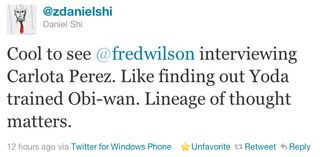Back when we were doing our MBA Monday series on Financing Options For Startups, I got an email from my friend Andy Sack. Andy was one of the first entrepreneurs we funded by in the mid 90s with our Flatiron Fund. He's done something like a half dozen startups since then and he's a veteran in the very best sense of the word.
Andy said "You missed an important option Fred – revenue based financing. I've got a new firm called Lighter Capital that does just that". I said, "Can you write a blog post for MBA Mondays explaining how it works?" So today, we have a guest post/advertorial on Revenue Based Financing from Andy/Lighter Capital. I hope you like it.
———
Fred’s series on alternative financing options has been awesome to follow, especially because it broadens the discussion of how companies can fund business growth when they can’t (or don’t want to) raise venture capital or bank debt. Fred’s original list missed one option – revenue-based finance – that's near to my heart and I’ve been encouraging entrepreneurs and angels to consider, and Fred graciously let me offer my insights here.
Disclaimer: I am founder of Lighter Capital and have a self interest in educating and promoting the use of this new type of financing called revenue-based finance. I’m also a serial technology entrepreneur and believe this type of financing has real advantages to traditional debt and traditional real advantages over equity for the entrepreneur.
A revenue-based finance (RBF) investment provides capital to a business by “selling” an ongoing percentage of a company’s future revenues to the investor. For simplicity, you can think of it as a revenue share type of arrangement. Investor gives capital to company in exchange for a small percentage of gross revenues. RBF lives as a hybrid of bank debt and venture capital. This kind of financing has been around for a while in non-tech industries such as mining, film production and drug development, but it’s recently been gaining traction in the world of growth finance and early-stage technology funding.
I want to explain how an RBF structure is different than traditional funding sources, detail what situations could be better suited for an RBF structure (for entrepreneur and investors alike), and offer a word of warning about the businesses that aren’t a good fit for the structure.
First, let me explain how a revenue-based loan works:
Instead of a typical bank loan which requires a business to pay a fixed interest payment, a revenue-based loan receives a percentage of revenues over a specified amount of time, allowing "interest" payments to fluctuate when a growing company has inconsistent cash-flows or lumpy or seasonal revenues. In a world where business costs such as software and infrastructure are increasingly becoming “as-a-service” and adjust with the ebbs and flows of a business needs, RBF payments automatically ramp up and down along with a business. It’s the inherent variability of RBF that makes the structure so appealing so appealing. Imagine if your business loan payment reduced to zero if your business revenue dropped to zero for an unanticipated quarter, and then automatically kicked backed on when your revenue returned. Another way of saying this is RBF turns loan repayment from a fixed expense to a variable expense.
So, when does it make sense to raise revenue-based funding?
Revenue-based loans are, by nature, most appropriate for companies already generating revenues but without hard assets typically required to get bank loans. It’s especially applicable for companies that have lumpy, seasonal, or hard to predict revenues.
For entrepreneurs, revenue-based loans are attractive to founders who are allergic to dilution and loss of control. The structure of RBF is often non-dilutive to founders and does not require a board seat. The financing is obtained without having to agree to a valuation, which leaves management in control of the company and typically requires no personal guarantees from management.
RBF means you can grow without swinging for the fences
For investors, funding using an RBF structure provides an opportunity to get a return on their investment without needing an exit. While this is clearly an advantage for investors, it also means company founders shouldn’t get as much pressure from investors to “swing for the fences” and the projected return due to the investor can be lower as the entrepreneur repays the investor more quickly.
As Fred has mentioned before, big exits are rare for startups. Some ideas have the potential to be home runs, but others are better suited to operate as smaller, standalone businesses. For the companies in the latter category, raising money from VCs who expect the big exits can misalign goals. A revenue-based loan has the potential to better align incentives for investors and founders in these cases. With that said, if you’re a pre-revenue, startup still figuring out your business model or considering some kind of “go big or go home” strategy, there can be realadvantages to working with the equity-based venture capital or angel investors. Similarly, certain businesses, especially brick-and-mortar and manufacturing-focused businesses may not have the margin profiles to pay monthly payments of 2-5% of revenues.
An RBF structure isn’t limited to specific funds – angels, VCs or banks could theoretically provide capital in this manner, but the risk/return profile of RBF doesn’t always fit the investor’s needs. Similarly, RBF may not be the best funding option for all businesses. In the right circumstances, the hybrid approach of revenue-based finance for startup funding can have advantages over traditional debt or equity, but there are admittedly situations where the more traditional options still make sense – such as restaurants or infrastructure-heavy startups.
If you’re considering raising money from angel investors, I’d suggest discussing this in the event that it may align your incentives better or at least help avoid some of the painful valuation negotiations. There are a few funds –Lighter Capital and Next Step in Texas, among others focused on this type of structure and I’d suggest taking a look at those options as well. There are clearly different scenarios where any number of Fred’s financing alternatives could prove more appropriate for your business, but the revenue-based loan structure can be a great option for profitable companies looking for a straightforward way to raise funding without dilution, change of control, or a personal guarantee.







